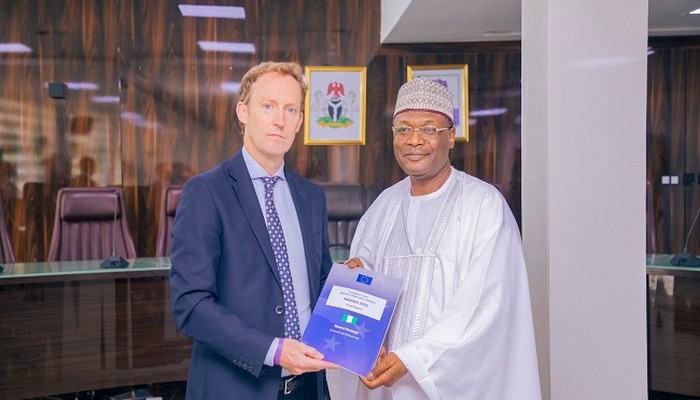EU Observation Mission says 2023 election exposes enduring systemic weaknesses, calls for reforms, enhance transparency, others

The European Election Observation Mission (EU EOM) to Nigeria has said that the 2023 election exposed enduring systemic weaknesses and therefore signal a need for further legal and operational reforms to enhance transparency, inclusiveness, and accountability.
This is part of what is contained in its final report presented to the Chairman of the Independent National Electoral Commission (INEC), Prof. Mamood Yakubu, in Abuja today, Tuesday.
“The European Election Observation Mission (EU EOM) to Nigeria has today published its final report on the federal and state elections of 25 February and 18 March.
“The Chief Observer, Barry Andrews, Member of the European Parliament, stated: “In the lead up to the 2023 general elections Nigerian citizens demonstrated a clear commitment to the democratic process. That said, the election exposed enduring systemic weaknesses and therefore signal a need for further legal and operational reforms to enhance transparency, inclusiveness, and accountability.”
“Following a three-month-long observation across Nigeria, and in accordance with its usual practice, the EU EOM is now pleased to present its findings and recommendations. Shortcomings in law and electoral administration hindered the conduct of well-run and inclusive elections and damaged trust in INEC. With the aim of contributing to the improvement of future elections, the EU EOM is offering 23 recommendations for consideration by the Nigerian authorities.
“We are particularly concerned about the need for reform in six areas which we have identified as priority recommendations, and we believe, if implemented, could contribute to improvements for the conduct of elections.” – said Barry Andrews.
“The six priority recommendations point to the need to (1) remove ambiguities in the law, (2) establish a publicly accountable selection process for INEC members, (3) ensure real-time publication of and access to election results, (4) provide greater protection for media practitioners, address (5) discrimination against women in political life, and (6) impunity regarding electoral offenses.
“Chief Observer, Barry Andrews, noted: “Importantly, there is a need for political will to achieve improved democratic practices in Nigeria. Inclusive dialogue between all stakeholders on electoral reform remains crucial. The European Union stands ready to support Nigerian stakeholders in the implementation of these recommendations.”
“At the invitation of the Independent Electoral Commission of Nigeria, the EU EOM carried out its work between 11 January and 11 April. A delegation of the European Parliament joined the EU EOM for the observation of the Presidential and National Assembly elections. The mission accredited a total of 110 observers from 25 EU Member States, as well as Norway, Switzerland, and Canada”.






